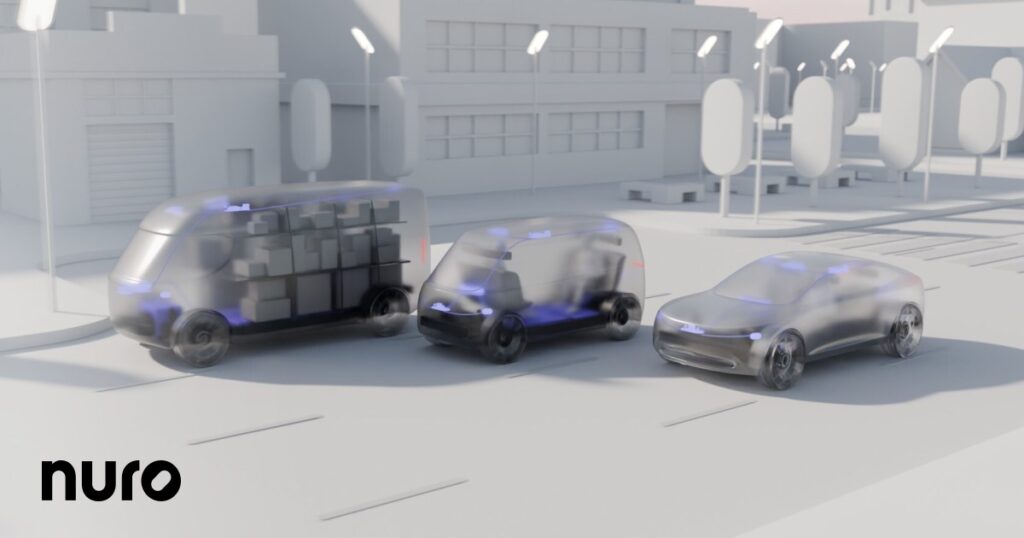Following several rounds of layoffs in 2022 and 2023, Nuro is shifting its business strategy to focus more on the startup’s core self-driving technology rather than owning and operating a fleet of low-speed roadside delivery robots.
The company said Wednesday it would begin licensing its autonomous vehicle technology to automakers and mobility providers such as ride-hailing and delivery companies.
Nuro had been a darling of the autonomous vehicle industry, raising more than $2 billion from high-profile investors, but its previous business model left it burning through cash quickly. The company’s founders said At the time of last year’s layoffs, the race to commercial delivery deployments was taking a toll, and by focusing on AI development, Nuro could extend its timeline from 1.5 years to 3.5 years until the unit economics make sense.
Nuro said it will now pursue two parallel go-to-market strategies: The first is similar to Nuro’s original offering: It will offer a full Level 4 autonomous driving product, including autonomous vehicle software and hardware, for goods delivery and passenger mobility services. The only difference is that Nuro will no longer make the cute delivery vehicles the company is known for. Last year, it had discontinued its partnership with Chinese electric vehicle maker BYD to make its third-generation R3 delivery robot.
The second strategy involves working with original equipment manufacturers (OEMs) and their parts and service suppliers to build automated driving products for consumer vehicles that will range from Level 2 to Level 4 driving systems.
The SAE Level 4 autonomy is defined as a driving system that can drive on its own without human intervention under certain circumstances. Levels 2 and 3 are versions of advanced driving systems that can perform some automated driving tasks but still require the human driver to remain attentive and take control.
“We believe that it is within our reach to provide [L4] “In personally owned vehicles, so the consumer use case for full L4 technology is what we’re most excited about,” Dave Ferguson, co-founder and president of Nuro, told britcommerce.
Ferguson told britcommerce that Nuro still has plenty of room to maneuver and doesn’t need to raise a new round to fund this business shift.
Nuro has not yet signed any partnerships, but has existing relationships with Uber and Toyota through its investor Woven Capital, the venture arm of Toyota subsidiary Woven Planet.
Nuro is not the only company that has realized that deploying and operating autonomous vehicles is like throwing money into the fire and that it is more economically viable to offer chauffeur service.
The startup will compete with others in the space such as the UK’s Wayve, which recently announced a partnership with Uber and also sells its self-driving technology to original equipment manufacturers (OEMs); and Mobileye, which is working with carmakers such as Porsche to provide automated driving technology.
Nuro’s new business strategy comes just over a month after the California Department of Motor Vehicles granted it approval to test its R3 robot in four Bay Area cities. The permit also allowed Nuro to test its technology at 45 miles per hour, up from 25 miles per hour before.
At the time, Ferguson told britcommerce that Nuro had no plans to deploy the R3, but would instead focus on developing and testing the autonomous technology.
Nuro has been teasing a new business strategy that will… Beyond the delivery of goods during the last month. The launch last month announced a “road trip” through 53 U.S. metropolitan areas to collect data to train its AI for urban, rural and highway driving. In late August, Nuro aware that its fourth-generation Nuro Driver, powered by Nvidia’s Drive Thor with Arm Neoverse technology, enables “AI-first L4 autonomous driving for multiple vehicle types.”
Nuro said that in four years, it has driven more than 1 million autonomous miles on public roads, with and without a safety driver behind the wheel, in Arizona, Texas and California as part of widespread testing and delivery partnerships with Uber Eats, Domino’s and FedEx.
Ferguson said Nuro’s self-driving software prioritizes safety through its AI architecture. The driver of the autonomous vehicle generates each action through end-to-end base models, but a more traditional robotic system operates in parallel as a backup. The backup system validates every step the AI driver takes in real time to ensure it doesn’t violate any constraints, such as vehicle dynamic limits or traffic rules.
“It’s not a question of if L4 autonomy will become mainstream, but when,” Jiajun Zhu, Nuro’s co-founder and CEO, said in a statement.

